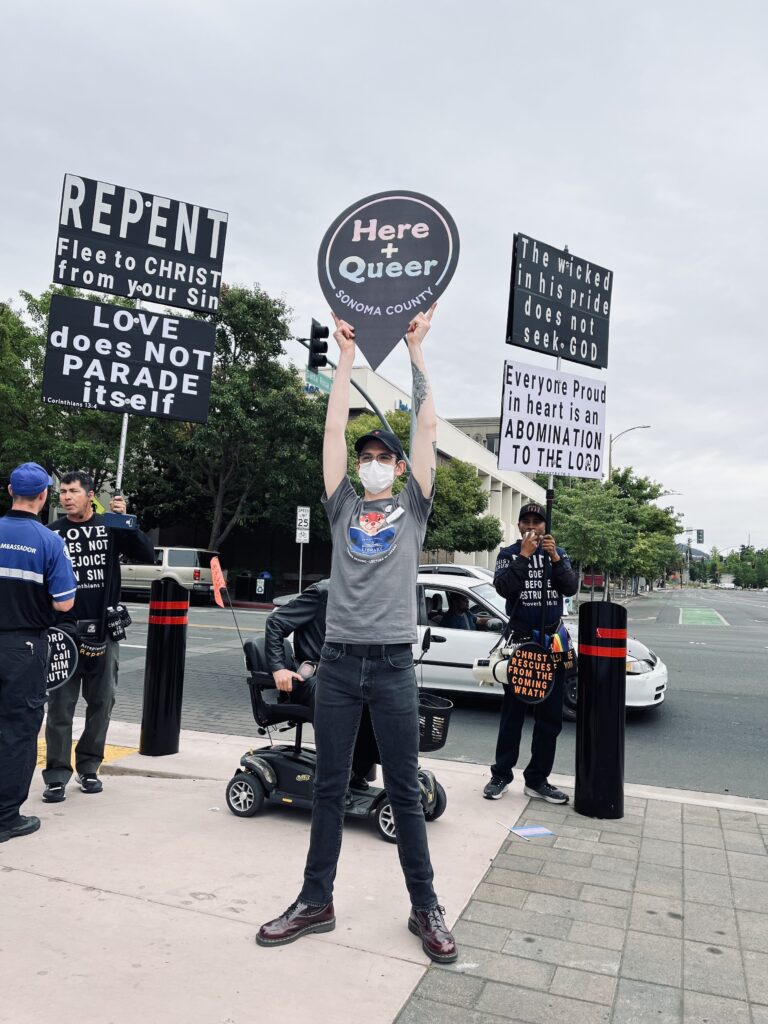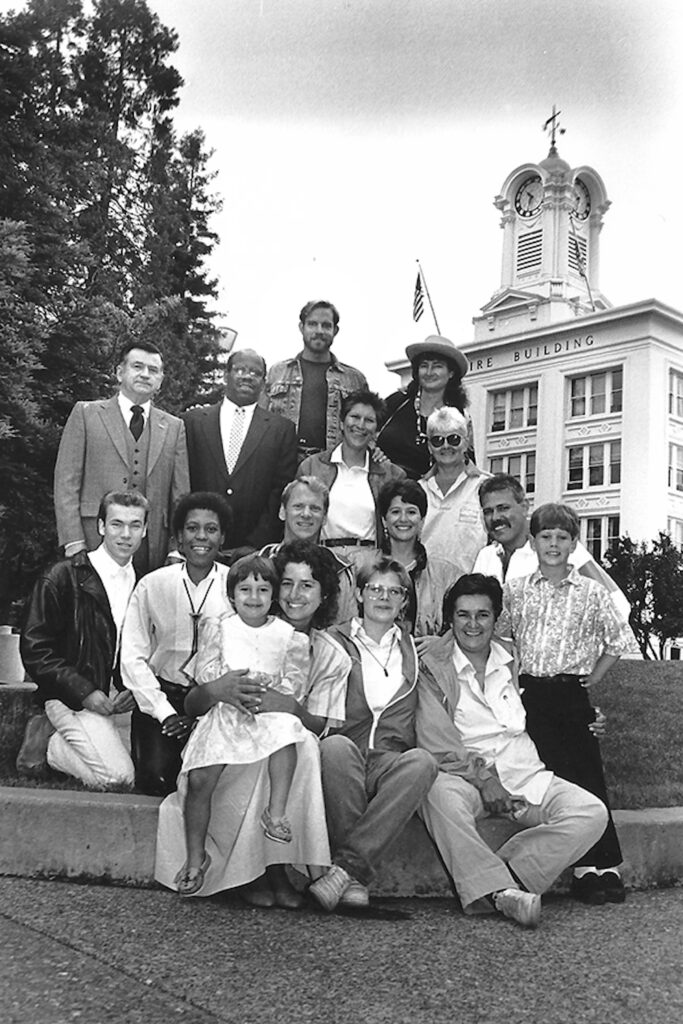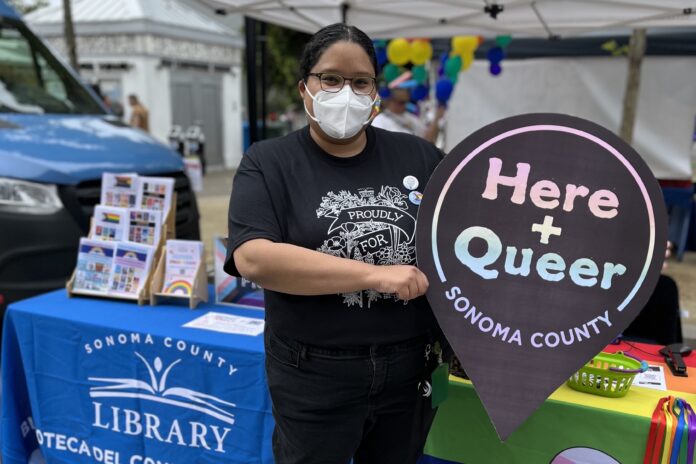This month, Sonoma County Library launched “Here + Queer Sonoma County,” a project to build a digital community-sourced archive of local LGBTQ+ history. Anyone is invited to submit documents preserving memories of queer life and culture in the county.
“A photograph at Pride, a wedding announcement, a video at a protest, a love letter to a first crush; these are all evidence of resistance and persistence,” said Zayda Delgado, supervising librarian at the Sonoma County History & Genealogy Library.
Led by Delgado, the project is designed by librarians Terra Emerson, Stuart Wilkinson and Javier Morales, who wanted to fill a gap in Sonoma County Library’s collection.
“We have such a rich LGBTQ history here in Sonoma County. But when we look in the library’s digital collection, if you search terms like queer, LGBTQ, gay, lesbian, you find very little. Part of what inspired the idea of the project was realizing that while there is this very rich in history here, it’s not really well documented, at least not in the library’s collection,” says Emerson, a teen services librarian.
While “Here + Queer” is the library’s first dedicated initiative to archive local queer and trans history, it is not the only archival work being done in the region. In 2007, a group of locals launched the “Lesbian Archives of Sonoma County” with a mission to document the involvement of lesbians in creating community for women in the county between 1965 and 1995. Another archive project, “LGBTQI+ LEGACY Sonoma County,” is just now launching, though it is the product of years of information- and ephemera-gathering by community activists who also curate the “Sonoma County LGBTQI History Timeline.” These projects focus on history up until the year 2000, whereas “Here + Queer” invites people to submit documents from any time, up to the present moment.
Delgado says, “Especially for communities that are marginalized—our BIPOC communities, our LGBTQ+ communities—our stories are more at risk of being silenced, erased. And so working with an organization like a public library to protect your story can give you a voice for the future.”

Archiving, Delgado says, creates an intergenerational relationship of empowerment in which people can deepen their understanding of themselves by learning about the advocacy, struggles and celebrations of the past.
“As we’re seeing pushback against LGBTQ+ rights, women’s rights, it’s important to see progression over time and the ebbs and flows of history. There’s an impact in seeing documents and learning, like, this person was fighting for this or seeing pictures of love that show you that people were trying to celebrate their lives [despite the oppression they faced],” she says.
Tina Dungan, a local LGBTQ+ archivist who grew up in Sonoma County, shares Delgado’s sense that preserving one’s history is particularly important in the face of oppression. Dungan and Shad Reinstein started the “LGBTQI History Timeline of Sonoma County” in 2018, during Donald Trump’s presidency, which she describes as the beginning of a pretty scary time for gay, lesbian and transgender people.
In the first year of his presidency, the Trump administration removed all mentions of LGBTQ+ people from White House web pages, removed questions about sexual orientation from the U.S. Census and other national surveys, reinstated a ban that would prohibit transgender people from serving in the U.S. military, and signed an executive order that allowed for employers and federal agencies to discriminate against LGBTQ+ people and to have discretion to deny them services.
“Things were looking really grim, and we felt like it was really, really important to get that history safely housed to be accessible. A lot of us are getting old and not remembering things anymore, so it was a perfect chance to start working on [archiving],” Dungan says.
Since 2018, Dungan has taught a free course on the timeline through SRJC’s Older Adults Program. Through this work, she connected with other community historians, to teach on facets of local history she wasn’t as knowledgeable about, particularly around pushing LGBTQ+ advocacy into the mainstream. Dungan brought in Magi Fedorka and Adam Richmond to educate about their work in the activist group Forward Together and the Sonoma County Lesbian and Gay Democratic Club. In 1987, Forward Together began five years of advocacy, pressing for the Sonoma County Board of Supervisors to adopt a resolution observing Pride Week, which finally passed in 1992.

Through teaching the timeline course, Dungan and her collaborators have gathered a trove of ephemera for which they would like to find a permanent home. Although the search is ongoing, the group is already accepting submissions to grow their collection, calling the archival project “LGBTQI+ LEGACY Sonoma County.” “The Lesbian Archives,” which is primarily a video oral history project, ultimately housed their collection at the GLBT Historical Society in San Francisco. For “LGBTQI+ LEGACY,” Dungan is hopeful about the possibility of finding a home within Sonoma County.
“The fact that the Sonoma County Library has so many queer people working in it now is really exciting,” she says.
Delgado and Dungan feel shared enthusiasm about one another’s projects and agree that they’re complementary. “Here + Queer” will be the county’s first digital archive of LGBTQ+ history and is the only archive collecting work that extends to the present. Community members can submit documents to the library’s database online and, eventually, will be able to access the digital collections online, too. For well over a decade, many documents have been created and housed digitally—on cameras, smartphones and computers. This makes submitting to a digital archive particularly easy. To support the digital archiving of physical objects, the library is planning on hosting special events with scanning days.
Emerson says, “One of the goals of the project is to bridge the gap between the older generations and the younger generations of queer community members. We hope the archive will show the through line of how our older community members have shaped the lived reality of our teens, and for teens today to understand that their activism will continue to shape the lived reality of future generations.”
Dungan believes “Here + Queer” will introduce many younger people to the importance of history. She says that when you’re young and in the moment, you aren’t necessarily thinking about how people will—or won’t—be able to find your work later.
“We didn’t put dates on the flyers we made. When you’re young, you don’t worry about stuff like that. The fact that Zayda and the library are getting it together now is really great because they’ll be able to remember more and they’ll be able to save things that might not otherwise get saved,” Dungan says.
‘Here + Queer Sonoma County’ is accepting submissions at sonomalibrary.org/queersonoma-en.
To inquire about submitting to the ‘LGBTQI+ LEGACY Sonoma County’ archive, contact le********@***il.com.
Tina Dungan teaches ‘LGBTQI History: A Sonoma County Timeline,’ a free course on Zoom through SRJC’s Older Adults Program, on Wednesdays from 1:30-3pm. For more information, contact cd*****@*******sa.edu.
‘The Lesbian Archives of Sonoma County’ collection can be accessed at the GLBT Historical Society archives. To learn more, visit www.glbthistory.org/archives-about-visitor-info.









